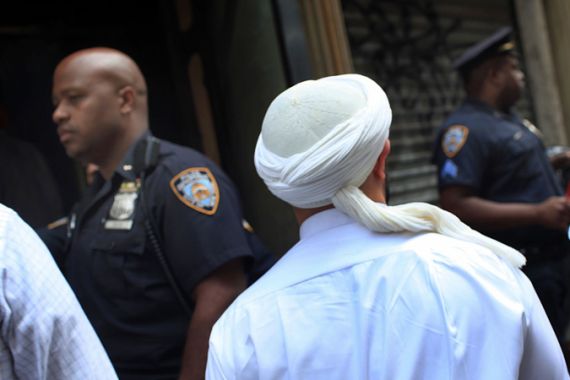US defends FBI sting operations
Attorney-general tells Muslim community group such law enforcement operations are “essential” to prevent attacks.

 |
| Muslims in the US have said they feel stereotyped by law enforcement authorities [GALLO/GETTY] |
The US attorney-general has defended the use of sting operations involving government informants, saying they are an “essential” tool in preventing attacks.
Addressing a Muslim community group near San Francisco on Friday, Eric Holder said he would make “no apologies” for a sting operation in which a Muslim was arrested while trying to detonate a fake bomb last month.
“These types of operations have proven to be an essential law enforcement tool in uncovering and preventing potential terror attacks,” Holder told the annual dinner of Muslim Advocates.
| Sting Operations |
|
A sting is carried out by undercover agents aiming to catch a person committing a crime. A typical sting will have an agent play a role as criminal partner or potential victim and go along with the suspect’s actions to gather evidence. FBI stings have included sending informants into mosques in search of would-be terrorists and enabling suspects to carry out fake attacks using dummy bombs. |
Somali-born Mohamed Osman Mohamud, 19, was charged last month with attempting to use a weapon of mass destruction at a Christmas tree lighting ceremony after he tried to blow up what he thought was a car bomb, supplied to him by undercover agents.
Mohamud’s lawyer has said agents were “grooming” his client for arrest and seeking publicity, a position which taps into concerns that Muslims in the US are being targeted and stereotyped by authorities.
“I make no apologies for how the FBI agents handled their work in executing the operation,” Holder said according to an advance copy of his speech.
“Those who characterise the FBI’s activities in this case as ‘entrapment’ simply do not have their facts straight – or do not have a full understanding of the law.”
A Baltimore man also was arrested earlier this week on charges he plotted to detonate a vehicle bomb at an armed forces recruiting centre in a separate case involving an undercover FBI agent.
Holder’s speech was focused on a call for better relations between Muslims and law enforcement and a promise to prosecute hate crimes.
He acknowledged that some Muslims and Arab Americans felt they were not being treated respectfully by authorities and other Americans, and said the government should reach out to those communities even as it pursues “potential terrorists”.
The FBI claims its use of informants has prevented numerous attacks since the events of September 11, 2001.
However, Muslim Advocacy is just one of several Muslim groups voicing concerns over the tactic.
“The relationship with law enforcement right now is tense,” Ibrahim Hooper, the spokesman for the Council on American-Islamic Relations told Washington Post in October.
“There’s a sense of being under siege in many Muslim communities. People just assume there are agents or informants in their mosque now. It’s a fact of life.”